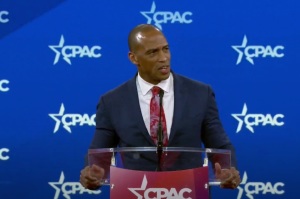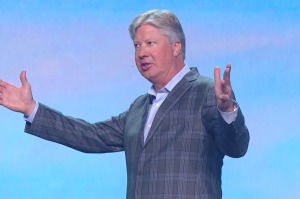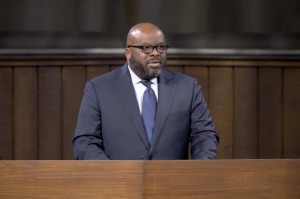A Call to Oneness
Following the decision of six jurors to acquit George Zimmerman of all charges in the death of Trayvon Martin, several thousand protesters gathered in New York City's Union Square and Reuters reported demonstrations in major cities on both coasts (Reuters.com 2013/7/15).
In Sanford, Florida, the town of 50,000 where Martin was shot on February 26, 2012, the anticipated unrest did not materialize, but the tension remains. Valerie Houston, pastor of the Allen Chapel A.M.E. Church, dedicated the following Sunday morning service to Martin. She prayed, "thanking the Lord for sending Trayvon Martin 'as a sacrifice for all of us'" (news.yahoo.com 2013/7/14).
Dr. Tony Evans, author of Oneness Embraced, understands the role of black preachers like Houston in African-American communities. In recent decades, he says, "the spiritual has taken a secondary role to the social and the political." But he also contends that the racial problem in America continues to be the reason we are not "one nation under God." And he asserts that "the fundamental cause of racial problems in America lies squarely within the church's failure to come to grips with this issue from a biblical perspective."
"Our failure to respond to this issue of biblical oneness," says Evans, "has allowed what never should have been a problem in the first place to continue for hundreds of years." Oneness Embraced, says Evans, is his "humble attempt to address the matter of the church, oneness, and social justice from an overtly biblical perspective."
Many may be familiar with Dr. Tony Evans through his radio program, "The Alternative View," which now reaches people in over 130 nations on more than 1,000 radio outlets. In 1985, however, as he was starting his radio ministry, a number of major Christian radio station managers told him there was no place for blacks in the general Christian broadcast media because his presence "would offend their white listeners."
Evans was the first African-American to earn a doctoral degree from Dallas Theological Seminary (DTS). As a seminary student, he was told that he was not welcome to worship at a prominent Bible church in Dallas. Since then, Evans has taught evangelism, homiletics, and black church studies at DTS. His church, Oak Cliff Bible Fellowship in Dallas, where he has been senior pastor for more than 35 years, now has close to 10,000 congregants and more than 100 ministries.
Permeating Evans' writing and speaking is his belief that God's "comprehensive rule over every sphere of life" should be carried out through the individuals, families, churches, and in every sector of society. This, according to Evans, is God's "kingdom agenda." As born again believers we have a citizenship that transcends our national citizenship-we are citizens of God's kingdom, and that, Evans says, is where our primary allegiance should be.
This is the context for Evans' challenge to the church to "embrace oneness" in Jesus Christ. If we are spiritually one in Christ, we should be able to rise above the cultural differences that separate us. Evans believes that is the only true path to biblical racial reconciliation. But it needs to start by confessing the sins that have caused the divide and addressing them within the church. Then, those who share a commitment to Jesus Christ can bond together across racial lines with the higher goal of kingdom service to others.
Practically speaking, says Evans, this starts as we develop intentional relationships with those fellow believers who are from different cultures and backgrounds than our own.
Ever since Christ commanded his disciples to be his witnesses "to the end of the earth," the church has been the most diverse institution on earth. But even the first century church struggled to reflect that oneness in Christ. In Acts 6, we read that the Hellenist Christians in Jerusalem claimed that their widows "were neglected in the daily distribution."
Later Paul had to address this issue in two of his epistles. Paul reminded the Galatians that inside the church, there is "neither Jew nor Greek, there is neither slave nor free, there is neither male nor female; for you are all one in Christ Jesus" (Galatians 3:28).
Writing to the Colossians, Paul reiterated this truth: "Here there is not Greek and Jew, circumcised and uncircumcised, barbarian, Scythian, slave, free; but Christ is all, and in all" (Colossians 3:11). He reminded the believers that not only should there be no divisions based on social status (slave, free) or religious background (Greek, Jew), but he very pointedly identified other cultural differences that might divide them.
Some in the church could have been barbarians, that is, non-Greek in culture. Some could have been Scythians, which was worse. We think barbarians are uncivilized-think of the word "barbaric." But in comparison to the Scythians they were like the Greeks or even the circumcised. Scythians were an ethnic group that lived on the north side of the Black Sea and were considered to be the most violent, uneducated, and uncivilized people known to the Greeks of that region. Yet, Paul told the Colossians that none of these differences mattered. "Christ is all, and in all."
In His high priestly prayer recorded in John 17, Jesus prayed for unity and oneness among those who would believe in Him in the future. "And the glory which You gave Me I have given them, that they may be one just as We are one: I in them, and You in Me: that they may be made perfect in one, and that the world may know that You have sent Me, and have loved them as You have loved Me" (John 17:22-23).
This was Jesus' prayer for you and me! And for all those who confess the name of Jesus, regardless of our ethnic backgrounds and racial origins.
As an evangelical African-American, Dr. Tony Evans has much to say to white evangelicals about the racial divide inside the church in America. Oneness Embraced is a call to the church to "oneness," which, Evans says, "glorifies God like nothing else because it reflects His image through His triune nature like nothing else."
At Truth in Action Ministries, we are working with diverse groups in communities around the country to help them realize that oneness in Christ. We too believe that doing so will "glorify God like nothing else." Soon we will be unveiling several major new initiatives in this effort. We hope that you will join us as we seek to glorify God and carry out His kingdom agenda.





























